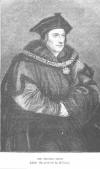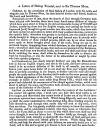|
Sir Thomas More (1478 –
1535)

Thomas More was born in London ca 1478. The son of a judge he had a reasonably comfortable youth and was sent to Oxford University. Later he completed his legal studies at New Inn and Lincoln’s Inn. He went on to teach law at Furnival’s Inn before becoming a member of the House of Commons in 1504.
More was also a writer and in 1516 wrote the seminal novel Utopia. The book tells the story of a seaman who discovered an island, called Utopia, on which the people lived in an idyllic state. On the island the people elected their government by secret ballot; they only worked for six hours a day and had community property Centuries ahead of its time, the people had free education and health care for for all. All goods were stored in large storehouses from which the people took what they wanted without payment. People were able to hold whatever religious beliefs they wanted, and both men and women were able to be priests. Some people claimed that in Utopia More was describing his vision of what England should be like. Others claimed that More had written the book as a joke intending to deride the move for change that was developing in Europe . He was a friend and associate with Dean Colet and the
humanist scholar Erasmus. Although his book favoured religious toleration, More was a devout Catholic and
eventually used his position to hinder the growth of Protestantism in England.
Without doubt More was a clever and able man who was introduced to Henry VIII by Thomas Wolsey. Recognising the merits of More and ever willing to make use of such men, Henry appointed him to several important posts :- Treasurer of the Exchequer (1521) and Chancellor of Lancaster (1525). He also served as Speaker of the House of Commons and sent on foreign missions to France. In 1529 Henry VIII appointed him Lord Chancellor
in succession to Wolsey. This was a notable event because it signified a
break with the clerics who had been filling the post since 1410. It
subsequently followed that the Reformation restored religion to the general
body of the church, but took away political power from the clergy. An
immediate effect of the appointment of More was a listing before Parliament
of Grievances against the Clergy, which hitherto had not been made public
for fear of retaliation and allegation of heresy.

Grievances before
Parliament.
A multi talented man, More was also a writer, and realised the power of books on people’s opinions. As a strong Catholic he drew up a list of Protestant books, including Tyndale`s English translation of the Bible, that he considered should be banned. Laws were promulgated and public burning of books took place.
Anyone selling Protestant books were treated more harshly and were likely to be burnt at the stake as a heretic.
Several persons, including Richard Bayfield, Thomas Garret, and Thomas Hitton were variously importers and distributors of books, including the
New Testament, and were burnt at the stake. In his later years More was
an enthusiastic supporter of the prelates and their pursuit of alleged of
heretics; he had been granted licence by Bishop Tunstall in 1531 to read
books in order to discover the heresies they [might] contain.,
.
Letter from Tunstall to
More.
It was inevitable that More opposed the king’s plans to divorce Catherine of Aragon. When Henry VIII rejected the Pope`s advice and went ahead with his marriage to Anne Boleyn, More resigned from office. Shortly after (1534) Henry VIII declared himself Supreme Head of the Church of England . More refused to swear an oath of allegiance accepting Henry as Head of the Church and was convicted of
treason. Still refusing to recant, he was executed at the Tower of London on 6 July 1535,
18/07/2011
|